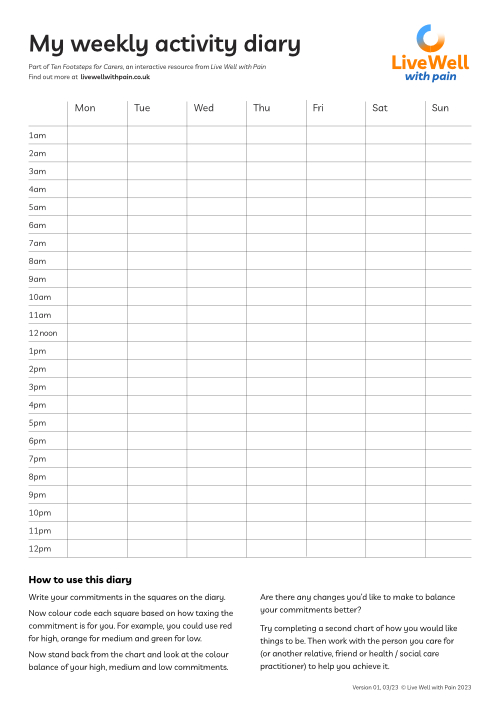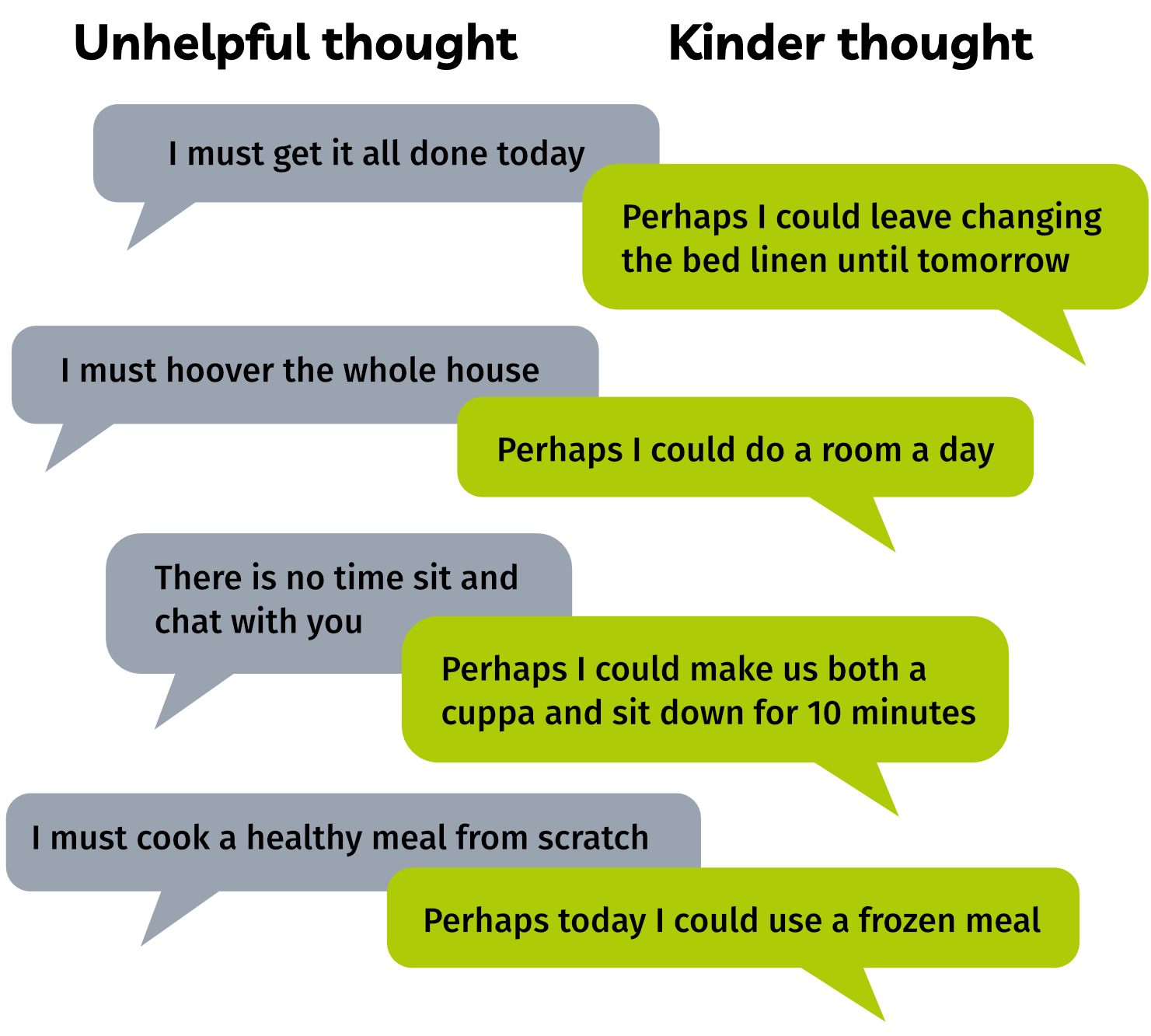Managing your commitments
We’ve already recognised that carers can become very overwhelmed with all their commitments. You may feel that you are constantly ‘chasing your tail’, do not have enough time to do what is needed, let alone have ‘down time’ for pleasurable activities.
So let’s look now at some useful tips for how you might manage your commitments . . .

1. Use an activity diary
If you want to get a clear idea of where your day goes and how you might possibly find some time for yourself, activity diaries are a really useful staring point.
How to use an activity diary
Over a period of a few days make a list of all of your different commitments.
Write your commitments in the squares on the diary.
Now colour code each square based on how taxing the commitment is for you. For example, you could use red for high, orange for medium and green for low.
Now stand back from the chart and look at the colour balance of your high, medium and low commitments.
Are there any changes you’d like to make to balance your commitments better?
Try completing a second chart of how you would like things to be. Then work with the person you care for (or another relative, friend or health/social care practitioner) to help you achieve it.
Carers weekly activity diary
If you are working with a carer, and want to help them achieve a better balance in their daily lives, an activity diary is a really useful staring point.
Specially designed for carers, the diary covers a seven day period. It includes simple instructions explaining how the person you're supporting can use it to better balance their commitments – and maybe even find some time for themselves.

2. Five teaspoons of energy
Another strategy that might help is “Five teaspoons of energy.”
Imagine you have a jar of energy and you are allowed five teaspoons from the jar every day. This is your “energy allowance.”
You can borrow a teaspoon from the next day, but that will only leave four on that day.
Alternatively, you could plan to only use four teaspoons one day, because you know you are going to need six teaspoons the following day. Maybe, on the six-teaspoon day you have to take the person you care for to a hospital appointment on a day when you have other commitments you cannot move. You know it is going to be a longer and very full day and you will need more energy.
Activity:
Look at your activity diary (see above) and think about days where you may need to borrow a teaspoon. Could you balance your activities better? Or perhaps call on someone for help?
The reason this is important is that if you keep exceeding your “teaspoons” you will get exhausted and become ill. Not only is that not good for you; it is also not good for the relative or friend you care for.
NOTE: if your weekly commitments constantly tax you at high and medium levels and you regularly exceed your five teaspoons of energy, you need to look at ways of including low level activities (Footstep 7 offers some ideas for moments of relaxation and mindfulness).
These can help to restore energy and balance activities.
Positive changes reported by people who learn to manage their commitments in a more balanced way include:
-
Sleeping better
-
Feeling more in control
-
Enjoying life more
-
Having down time or time for pleasurable activity
-
Having more energy
-
Potentially having less pain themselves
3. Managing thoughts
One of the challenges faced by some carers is that there is just so much to do.
We can end up thinking “I must get it all done today.” The Activity Diary and Five Teaspoons of Energy can help us. However, we also need to manage our thoughts.
The speech bubbles show some typical unhelpful thoughts about how much we might have to do, and some kinder ways of interpreting them.
Activity:
Draw your own speech bubbles – what are some of your common unhelpful thoughts and how could they be a little kinder?

Staying at work, or returning to work
Many carers work as well as caring. This section is for people who are in work and those thinking of returning to some form of work.
If you are thinking about returning to work a good place to start is to review your goals in Footstep 3 and discuss your ideas with the person you care for. You might want to talk about:
-
Why you want to return to work
-
What sort of work you want to do
-
How it might help your relationship
-
The barriers you see in returning to work – including your thoughts about how going back to work might affect them.
-
Their thoughts and opinions
Perhaps you are thinking of starting with some voluntary work to see how it goes before looking for a job that meets your needs as an individual and as a carer. Volunteering can help you explore new possibilities without the same level of demands as a paid job.
Perhaps you can start with just two or three hours and steadily build up from there? This has helped many people get back to work.
Another route to getting back to work is retraining.
Perhaps you are returning to a job that has been held open for you, but that you needed time away from at a stage when your carer’s role was particularly demanding. It may be a good idea to discuss a phased return with your employer; this could be as little as a few hours per week. However, you will need to be flexible to meet not just your needs, but those of your employer and their business. It is no good being available between 8am and 10am if your employer runs a café and you are the lunchtime waitress or waiter.
Karen’s story
Karen used to work in the Post Office. She gave up work as her wife’s needs increased and has not been employed for 13 years.
Karen’s wife’s health has improved and Karen is now wondering about the future. She is testing the waters with some voluntary work – a few hours per week, but would really like to look for opportunities to take her love of photography forward in paid employment.
She has discussed her ideas with her wife and is beginning to look into how work will affect their lives and finances.
“It is all a bit scary, but quite exciting as well.”
Already in work?
If you’re already in work, how long is it since you reviewed your work goals (see Footsteps 4 – setting goals) or spoke to the person you care for about how your work commitment either benefits or conflicts with your carer role?
You may want to explain to them how important your job is to you – or perhaps it is not. You may want to share that you are struggling with competing commitments or that you have been offered a promotion. You may want to find out how they feel about you working and your work-related goals.
As well as talking to the person you care for, perhaps you also need to speak to your employer about your hours. You may need to reduce them or only work particular times or days of the week. Of course, this also has a financial implication, which you will need to consider and perhaps seek help with. Footstep 1 has some resources that could help here.

When work becomes an escape
People find being in work a good experience. It can help establish a routine and provide an opportunity to get to know more people. However, some people can slip into using work as an escape route, as Dee discovered when her caring commitments increased . . .
Read Dee’s story
In this section we’ve posed a number of questions and you might want to now take a few minutes to think of your own questions and possible solutions.
One final thought: returning to work or staying in work can be beneficial for the person you care for. It may help them to do more for themselves, have their own life, feel useful, free them to return to work if that is appropriate, help the household finances and help you both feel good about each other and your lives.
Managing your commitments
Key ideas
✔ Activity diaries are a really useful way to get a clear idea of how you might possibly find some time for yourself
✔ Another strategy that might help is “Five teaspoons of energy”
✔ Try changing ‘unhelpful thoughts’ into kinder ones
✔ Returning to work or staying in work can be beneficial to you – and the person you care for too
Next footstep
